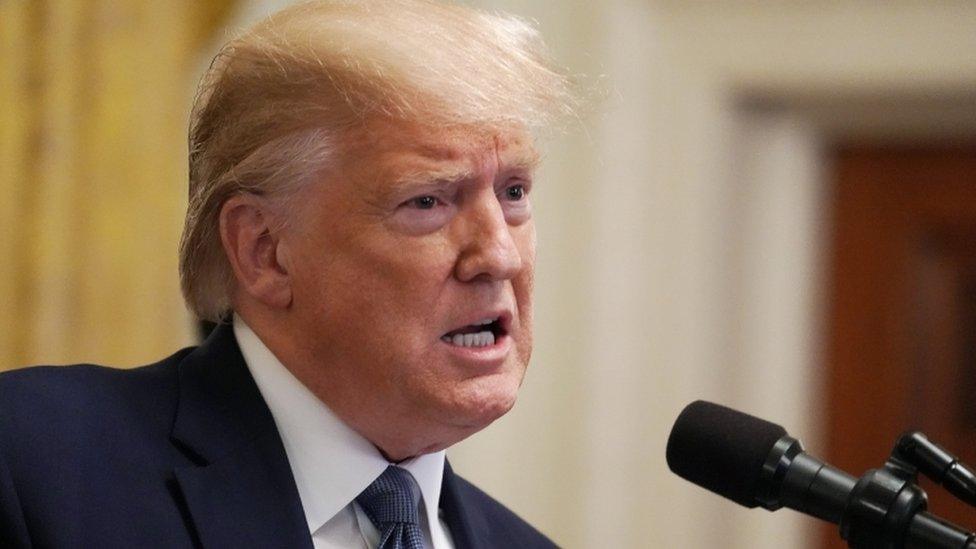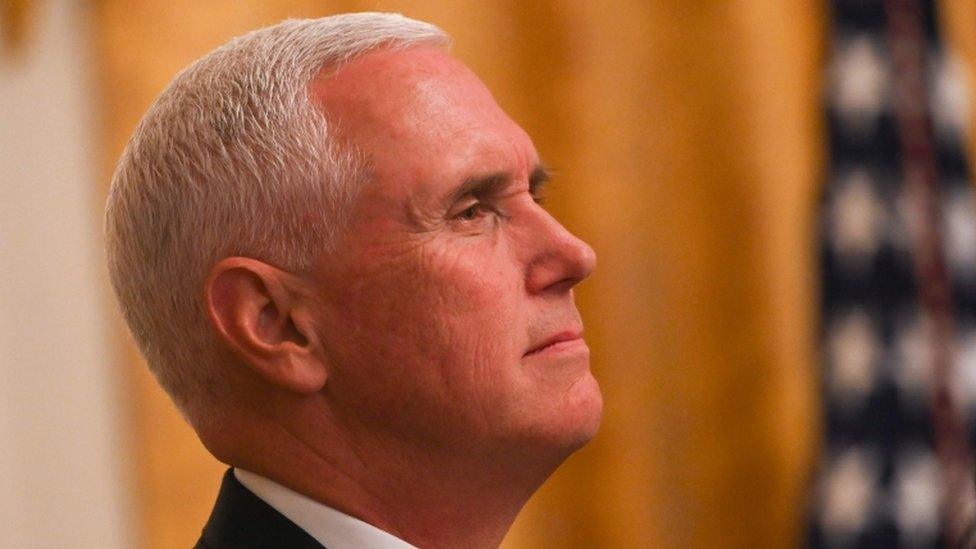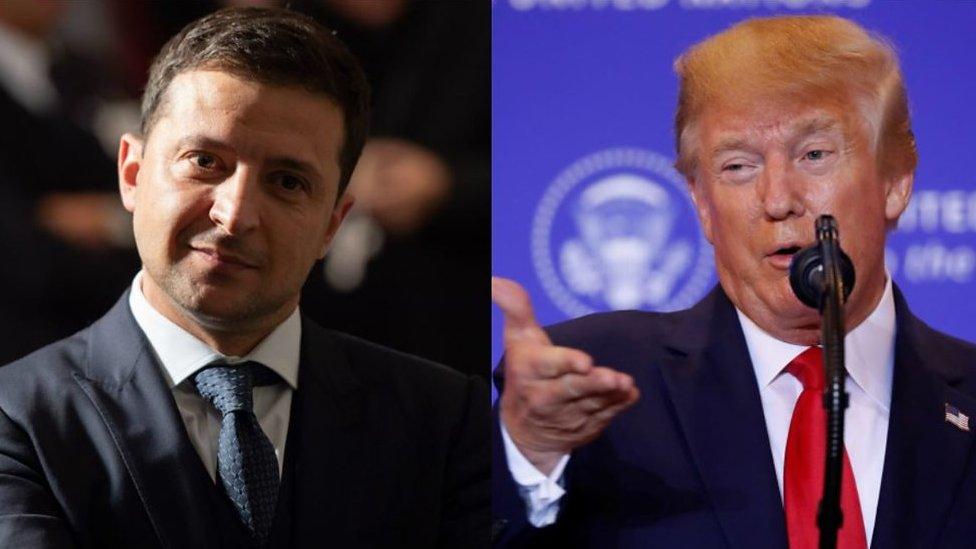Trump-Ukraine inquiry: Democrats demand documents from White House
- Published

In a letter to the White House, Democrats said President Trump had "chosen the path of defiance, obstruction, and cover-up"
US Democratic lawmakers have demanded documents from the White House as part of their impeachment inquiry into President Donald Trump.
The documents relate to a call between Mr Trump and Ukrainian President Volodymyr Zelensky on 25 July.
In the call, Mr Trump asked Mr Zelensky to investigate his leading Democratic political rival, Joe Biden.
The impeachment inquiry stems from the call, which was flagged up by a whistleblower in August.
The whistleblower alleged that Mr Trump used a $400m military aid package to Ukraine, which had been suspended earlier in July, as leverage to persuade Mr Zelensky. The White House released the aid in September.
Mr Trump has denied any wrongdoing, accusing his political opponents of a "witch hunt".
But in a move to crank up the pressure on the president, the three House committees leading the investigation have given him until 18 October to hand over the documents.
"We deeply regret that President Trump has put us - and the nation - in this position, but his actions have left us with no choice but to issue this subpoena," the Democrats wrote in a letter to the White House.

Democrats have asked Mike Pence for documents to clarify his role in the Ukraine affair
The subpoena - an order to hand-over evidence - was issued on Friday by the chairmen of the committees for Oversight, Intelligence and Foreign Affairs, external.
White House press secretary Stephanie Grisham sought to play down the subpoena, saying it "changes nothing".
A separate request for records has also been sent to Vice-President Mike Pence, with Democrats asking him to clarify "any role you may have played" in Mr Trump's overtures to Ukraine.
What we know about Biden-Ukraine corruption claims
If Democrats manage to impeach Mr Trump - by way of a vote in the House of Representatives - a trial would be held in the Senate.
Senators would have to vote to convict Mr Trump by a two-thirds majority to remove him from office.
But that outcome is seen as unlikely given that the president's fellow Republicans control the Senate.
What documents are the Democrats demanding?
A rough transcript of the 25 July call has already been released, but Democrats want to see a range of documents and communications linked to it.
In the committees' letter to the White House, they accused Mr Trump of "stonewalling" multiple requests for the records.
By refusing to voluntarily release the documents, the Democrats said Mr Trump had "chosen the path of defiance, obstruction, and cover-up".
Failure to comply with the subpoena would amount to "evidence of obstruction", which is also an impeachable offence, the committees warned.
What's the latest reaction?
On Friday, Mr Trump said Democrats "unfortunately have the votes" to impeach him, but predicted he would win in a trial in the Republican-led Senate.
Most Republicans are standing squarely behind Mr Trump, though two Republican senators have spoken out against the president.
Mitt Romney of Utah labelled the president's actions "appalling" on Friday, external.
Trump calls for China and Ukraine to investigate the Bidens
His remarks came a day after Mr Trump publicly called on Ukraine and China to investigate Mr Biden and his son, Hunter.
There has been no evidence of wrongdoing by Hunter Biden, who served on the board of the Ukrainian gas company Burisma until earlier this year.
On the same day, text messages released by congressional Democrats showed how US officials worked to prod the Ukrainian president into opening a public inquiry into Mr Biden.
Could there be a second whistleblower?
As the fast-moving investigation into Mr Trump escalates, there are reports of a second intelligence official considering making a complaint against the president.
The New York Times said the unnamed official had "more direct information", external about the events surrounding Mr Trump's phone call with Mr Zelensky.
Michael Atkinson, the general inspector of the intelligence community, interviewed this official to corroborate the original whistleblower's allegations, the paper reported.
Given the original whistleblower, reported to be a CIA official, did not directly witness the call, the testimony of a second official could prove valuable to the Democrats' inquiry.

Four quick questions on Trump-Ukraine
Why is Mr Trump being investigated?
A whistleblower alleges he used "the power of his office to solicit interference from a foreign country in the US 2020 election", by asking Ukraine to investigate his main rival, Joe Biden.
Is this illegal?
If this is what he's proven to have done, then yes: it's illegal to ask foreign entities for help winning a US election. Mr Trump says it's a witch-hunt and he did nothing wrong.
What could happen next?
If the Democrat-controlled House of Representatives voted to impeach Mr Trump, there'd be a trial in the Senate.
Could he be removed?
A Senate vote needs a two-thirds majority to convict, but Mr Trump's Republican party controls the Senate so that's unlikely. And the Mueller inquiry made clear you can't charge a sitting president with a crime.

- Published26 September 2019
